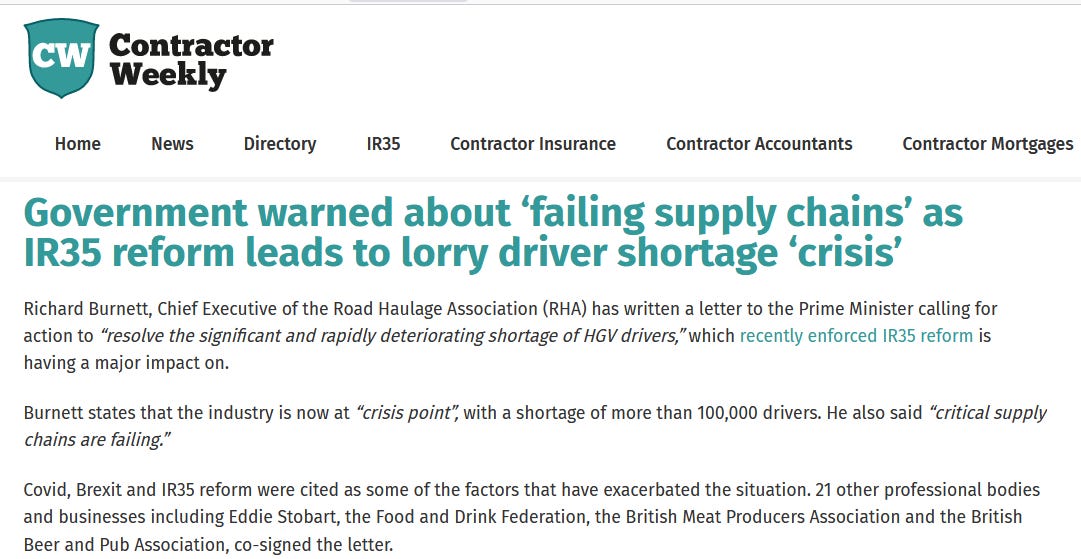The mysterious case of an under-reported reason for truck driver shortages
How our habitual media consumption gives us blind spots (and what you can do about it)
It might sound counter-intuitive, but I'm in the middle of a personal project to become less certain about things by becoming better informed. The idea sprang from noticing that feeling certain about many political and cultural controversies was making me mentally unhealthy.
Being very online in a highly motivated but extremely selective information bubble all the time was leaving me frustrated, angry and contemptuous of whole swathes of humanity. And addicted to banging on about it.
By extracting myself from this situation I've realised a few things:
It's comforting (in an empty way) to think you have all the answers
Being certain makes you angry that other people are too stupid or bad to see what you see
It's cognitively hard work to consider alternative perspectives
Paying attention to perspectives you preferred to ignore for a long time is emotionally jarring (more on this in a future piece)
When alternative perspectives start to make sense it's tempting to just switch sides and reject everything you previously believed. Thus transforming from being one kind of dick to another kind of dick (more on this in future too)
I feel calmer and happier the less certain I am
How we feel matters a lot, even though we like to see ourselves as evidence-led rational beings. This is why, I think, we don't change our minds very often. The documented evidence that we feel our way to 'truth' rather than divine it through evidence is overwhelming.1 If this were one of those experts giving sermons from the mount kind of publications I'd take you through that evidence. But it's not. Rarely Certain is a here's how it is for me - see if you can relate newsletter.
You may be happy thinking that you know more than everyone who doesn't share your views and see the world in a similar way. All I can say is that I found that I wasn't.
It came to a head in 2016, with Brexit and Trump creating what I now look back on as a tsunami of social hysteria. I was in the thick of it all, courtesy of my fondness for bloviating on Twitter and the attention I received from portraying myself as a minor expert in 'disinformation' and a good social liberal.
As I grew disenchanted with the smugness, bullying, finger-wagging and cultish holier-than-thou moralising of my tribe I stepped back and began to investigate why the 'other side' hated us so much and why we hated them. It wasn't hard to work out why.
We (the libs) were as poorly informed as them ('conservatives').
Here's what I did about it and why I now practice radical uncertainty.
First I deleted The Gardian2, NYT and BBC News apps from my phone and stopped using Twitter.
I investigated a range of news and commentary sources from across the political spectrum.
I'm not joking.
Here's the daily reading list I chose:
World Socialist Website (very left)
Mediapart (left - French - I financially support this site)
OpenDemocracy (left/liberal - I also financially support this site)
France24, Reuters, AP (liberalish/neutral)
Quillette (right)
I quickly learned that good faith journalism exists across ideologies. And that it's possible to read publications that don't keep reinforcing your prejudices without reflexively rejecting their perspectives.
I also learned that no one is 'right' all the time, or indeed 'wrong' all the time.
For example, the World Socialist Website seems to think that questions around China's behaviour and responsibility for Covid-19 is entirely founded on oppressive Western imperialism. Which seems daft to me. But it was the first publication to reveal serious holes in the NYT's 1619 Project with impeccable forensic journalism.
But you can only learn so much from special investigations and commentary.
The game-changer came when I discovered Ground News with its 'Bias Ratings' and 'Blind Spot' reports.
Ground News is essentially a news aggregation app that draws from international sources and presents coverage of events across the political spectrum. Take any story and you can read how it's reported by publications across the political spectrum.
It's an eye-opener. And the biggest eye-opener for me has been the 'Blind Spot' reports, through which you can see how much news you are missing by limiting your attention to familiar news sources.
News bias comes in several forms and you know what it looks like. But the most interesting bias is what doesn't get reported at all, on the right and the left.
You don't know what you don't know. But when you do begin to know what you previously had no idea about, some of the reasons that other people think the way they do start to make sense.
Want to know about the latest Police-on-Black killing in America? Want to know about the latest Police-on-White killing? Or the latest woman to be physically assaulted for objecting to penises in women's changing rooms? You'll rarely find all these stories in the same place. Left-leaning publications and right-leaning publications may as well be reporting from different planets. Ground News makes the world seem whole again by bringing it all into one place. Turns out that the 'truth' is messy, complicated and confusing. I love it. It's making me less smug about how right I am by the day.
To finish up, here's an example of a liberal media-induced blind spot from this week.
It’s The Guardian reporting on the mounting problems in Britain's supply chains due to a shortage of truck drivers. What's interesting here is the factor they are not reporting.
This is poor journalism. The missing reason in this list is a new Inland Revenue rule called IR35, which treats contractors as staff for tax purposes. It is leading many people, who prefer to work for themselves rather than take a staff position with an employer, to quit working altogether. I'm told that IR35 is rarely - if ever - mentioned in anti-Brexit circles, where The Guardian is probably top of the go-to list of news sources.
This is how your blind spots form.
And if you don't believe me, here's some expert journalism on the subject. From Contractor Weekly.
Read the story here on Contractor Weekly.
On Twitter? Try sharing that story with anti-Brexit people and see what happens. Let me know, if you like.
If you're new to this area and want to know more try looking up terms like 'System 1 and System 2' thinking. You'll soon find yourself down a rabbithole of insights into how our supposedly rational minds work.
This piece explains another troubling aspect of my hitherto favourite newspaper and why I deleted it from my life. My perception that it seems to have become an irresponsible, audience-pandering click factory, rather than a serious news source.
Main picture credit: Anemone123 on Pixabay




